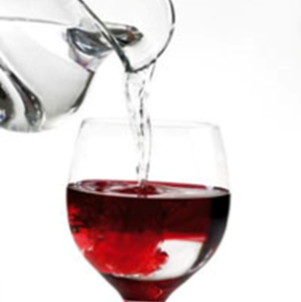The first recorded miracle of Jesus Christ was turning water into wine at a wedding celebration. Let’s look at how ancient wedding customs can shed light on the significance of this miracle found in the second chapter of John (John 2.1-10).
The account starts with, “On the third day”. If we look back to the previous chapter of the book of John, we find that it was the third day since Christ had begun to call His disciples to follow Him, and three days since John the Baptist had acknowledged Him as the “Lamb of God.”
At the wedding itself, Christ and His disciples were present when the wine ran out. He was informed by His mother, Mary, of the situation. Modern wedding parties usually last only the day of the ceremony and ensuing reception meal. But in the ancient world wedding celebrations could last seven days! This required a lot of food and wine, and a lack thereof could shame the family. So, when Jesus turned 120 to 180 gallons of water into wine at the celebration, it was an impressive contribution!
The ancient wedding contract began with a “ketubbah,” a document that betrothed a bride to her husband, after her consent, and was signed by her husband-to-be and her father. Compare this to our baptism, we also agree to a contract? God called us, we answered, and then we repented of what we were.
With these signatures, the couple was 100% married, but not yet allowed a sexual relationship. Joseph and Mary were in such a contract when Mary became pregnant with the Son of God.
The second stage of a marriage was the “chuppah”, or sexual consummation. It might be several years before the groom was able to raise enough money to meet the bride-price. At last, the father sets the date for the consummation, at which time it must be confirmed that the bride is a virgin.
“For I feel a divine jealousy for you, since I betrothed you to one husband, to present you as a pure virgin to Christ.” (2 Corinthians 11:2 ESV). After baptism we had hands laid upon us to give us the Holy Spirit, helping us to become the spiritual virgin we must be for our marriage to the Lamb in the figurative consummation.
Christ has already paid the price for us, so next, the date for the wedding must be set by the Father: “But concerning that day or that hour, no one knows, not even the angels in heaven, nor the Son, but only the Father.” (Mark 13:32). In the meantime, we wait for the groom and remain watchful.
At the wedding, Christ chose six stone water jars and had them filled with water and it was in these vessels that He miraculously changed that water into wine. These were jars used to store water for ritual purification for guests as they entered the wedding feast. Ceremonial washings were an integral part of first-century Judaism (Mark 7:1-4). What a clear parallel to the symbolism of baptism by immersion.
The finished product of this miracle was an excellent vintage (John 2:10). A perfect example of Christ, of quality, the very best.
But it was more than water into wine. It involved a wedding ceremony and Christ went out of His way to help make it a success. He has done the same for us. As for the bride price for us, for mankind, He was asked to give everything He had. And He did, so that we might, as spirit beings inherit the Kingdom of God. Let’s never forget the deep meaning of that first miracle!
Scott Souder


